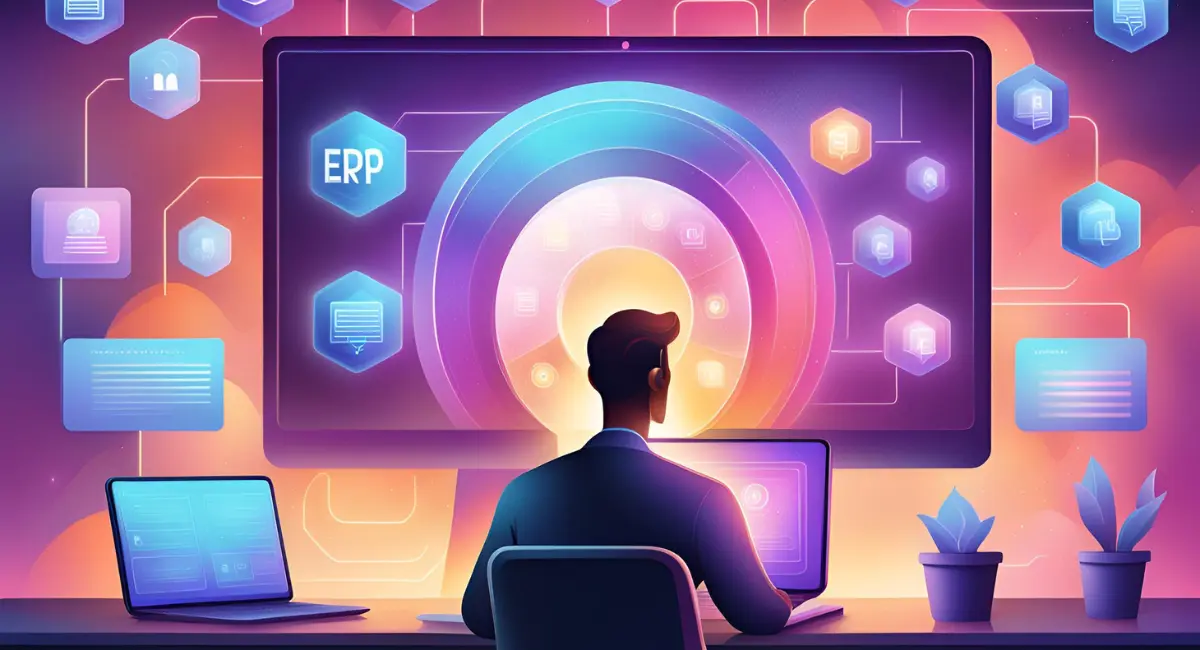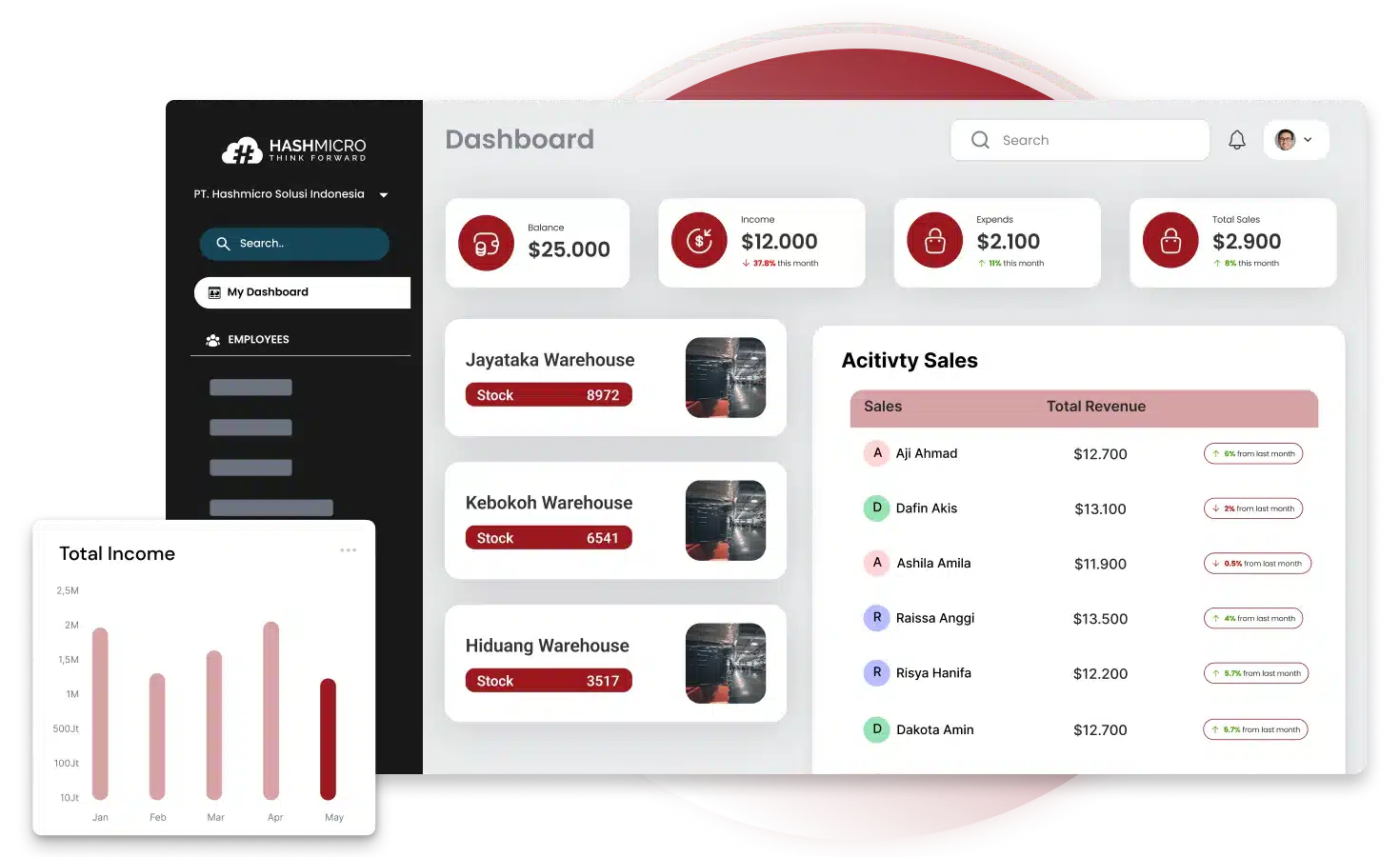Enterprise Resource Planning (ERP) software integrates various business processes into a single system, including finance, inventory, and human resources. By centralizing these operations, ERP helps businesses streamline workflows, enhance productivity, and minimize errors.
More businesses in Singapore, regardless of size, are adopting ERP software to improve efficiency. Without ERP, companies risk losing vital resources and missing growth opportunities.
As you continue reading, you’ll learn how our ERP system can simplify complex processes and support smarter business decisions. Let’s dive in!
Table of Content:
Table of Content
Key Takeaways
|
What is ERP?
ERP or Enterprise Resource Planning is a system that automates business processes. It unifies tasks and data for better decisions, higher efficiency, and simpler operations.
It centralizes data from finance, HR, CRM, and more so you can access reliable information in one place. With cloud-based AI and machine learning features, ERP frees you from manual tasks, powers smarter planning, and keeps your entire organization aligned for growth.
Why is it Important?
ERP is important because it unifies core processes like finance, inventory, HR, and sales into one system, ensuring smooth data flow and better efficiency. Centralizing information reduces errors and gives real-time insights, helping businesses make faster, smarter decisions.
This allows companies to adapt quickly to market changes, optimize resources, and improve collaboration for sustained growth. Leading providers like HashMicro, SAP, and Oracle offer industry-specific solutions, making ERP a flexible and scalable tool for long-term success.
Hashy AI Fact

Need to Know
In today’s fast-moving business world, AI for ERP helps unify processes, eliminate manual work, and drive smarter decisions. All from one powerful system.
Request a free demo today!
A Historical Overview of ERP
ERP (Enterprise Resource Planning) originated in the 1960s to oversee inventory and production schedules within the manufacturing sector.
By the 1980s, Material Requirements Planning (MRP) evolved into MRP II, which incorporated additional production elements such as capacity planning and shop-floor management.
In the 1990s, ERP expanded beyond manufacturing to encompass other business functions, including finance, human resources, and supply chain management. Today, ERP systems are more flexible, often cloud-based, and accessible to organizations of all sizes.
How Does ERP System Work
An ERP system helps businesses run smoothly by integrating all core processes into a single platform. It collects, stores, and organizes data from various departments, ensuring consistency and easy access.
Here’s how it works step by step:
- Data Collection – Gathers information from finance, sales, HR, inventory, and other departments.
- Centralization – Stores all data in one unified system, eliminating silos and duplication.
- Integration – Connects different processes so they work together seamlessly.
- Automation – Reduces manual tasks like order processing, payroll, and reporting.
- Real-Time Updates – Provides instant insights to improve decision-making and responsiveness.
- Process Optimization – Helps businesses allocate resources efficiently and minimize waste.
- Continuous Improvement – Uses analytics and AI to refine operations and drive long-term growth.
With these steps, ERP simplifies complex operations and keeps businesses agile in a fast-changing market. It eliminates inefficiencies, enhances collaboration, and ensures that every department has the data it needs to perform at its best.
The Benefits of ERP System for Businesses
Common Modules in ERP System
ERP software consists of modules designed to assist employees with specific business functions. Each module integrates with the ERP database, ensuring a single source of accurate data, even as new modules are added.
Here are some of the most commonly used ERP modules:
- Accounting – Tracks finances, automates billing, and generates invoices while monitoring payments.
- Procurement – Manages purchasing, vendor info, and order tracking, updating inventory upon receipt.
- Manufacturing – Plans production, ensures material availability, tracks progress, and provides real-time insights.
- Inventory Management – Monitors stock levels, movements, and sales patterns to prevent shortages.
- Supply Chain Management – Oversees logistics, supplier coordination, and end-to-end tracking.
- CRM – Stores customer data, enhances service, tracks sales leads, and manages marketing efforts.
- HRM – Centralizes employee records, tracks hours, benefits, and performance evaluations.
- POS – Automates sales, updates inventory, and integrates sales data with business operations.
- Asset Management – Tracks assets, schedules maintenance, manages depreciation, and ensures compliance.
Types of ERP Deployment Models
Various ERP systems are designed to meet different needs and deployment options. Understanding these options can help businesses select the right ERP system that aligns with their specific requirements and objectives.
Here are the ERP deployment models available to companies:
1. On-premise
On-premise ERP involves installing the software directly on a company’s servers and infrastructure. This setup provides complete control over the system and data and entails high setup and maintenance costs.
While on-premise ERP has traditionally been the preferred choice, it is rapidly overshadowed by cloud-based systems, prompting companies to plan their upgrades carefully for a smooth transition.
2. Cloud
Cloud ERP is hosted online and accessed via the internet, eliminating the need for extensive on-site infrastructure. It offers flexibility, scalability, and cost-effectiveness, allowing access from anywhere, anytime. There are two variations:
- Hosted Cloud Solution: The company purchases a license and operates it on third-party remote servers, storing data in a private cloud (single tenant). This setup provides more control and customization but requires more significant effort from the business, striking a balance between on-premise and fully cloud solutions.
- True Cloud Solution: Companies pay for access to servers and software completely managed by the vendor (multi-tenant). Software as a Service (SaaS) ERP is a typical example, where the provider handles updates, making it more affordable and accessible to manage.
3. Hybrid
Hybrid ERP, also called two-tier ERP, combines cloud and on-premise ERP models. This approach allows businesses to benefit from both deployment options by keeping sensitive data on-site while utilizing the cloud for other functions, effectively providing the best of both worlds.
Indicators That Your Company Needs an ERP System
Identifying signs that your business might benefit from an ERP system enhances operational efficiency and fosters growth. Inefficient manual processes can impede productivity and result in errors.
Below are key indicators that suggest it may be time to consider implementing an ERP solution:
- Lack of Data Visibility and Accuracy: If your business struggles to track data or lacks real-time visibility into operations, ERP software can centralize your data, ensuring it is consistently up-to-date and accurate.
- Inefficient and Fragmented Processes: If you perform manual tasks and use multiple software solutions for different functions, ERP can streamline operations, reducing errors and saving time.
- Difficulty Meeting Customer Demands: If fulfilling customer demands is challenging, an ERP system can help manage orders more effectively and enhance customer satisfaction.
- Insufficient Reporting and Analytics: When your current systems do not provide adequate reporting or insights, ERP software can offer detailed analytics to support better decision-making.
- Limited Scalability and Growth: Existing systems may become insufficient as your business grows. An ERP system can scale with your company, effectively handling increased transactions and users.
- Inadequate Regulatory Compliance: If meeting legal requirements is a concern, ERP software can help ensure compliance by enforcing standardized processes and maintaining detailed records, helping avoid potential legal issues.
Choosing the Right ERP Software System for Your Business
Digital transformation is accelerating, prompting businesses to adopt cloud-based ERP systems for improved access, reduced costs, and easier integration. Companies seek flexible, industry-specific, personalized ERP solutions to meet users’ unique needs.
Given the importance of selecting the right ERP solution in Singapore, companies must be discerning, as this will serve as a critical platform for storing and managing data for years to come. Here are some key considerations to keep in mind when choosing an ERP system:
- Identify Business Needs: Assess your priorities to select an ERP software that aligns with your requirements.
- Evaluate ERP Vendors: It is crucial to choose the right vendor; opt for one with proven industry expertise and a history of successful ERP implementations.
- Consider Scalable and Customizable Systems: Select an ERP system that can be tailored and scaled to accommodate your evolving business needs.
- Conduct a Cost Analysis: To ensure the ERP software’s long-term financial viability, perform a Total Cost of Ownership (TCO) analysis.
Reduce Headaches with HashMicro’s ERP Software
HashMicro provides the best ERP system in Singapore, offering integrated software that simplifies and automates complex business processes. With a proven track record of successful implementations, HashMicro delivers tailored, industry-specific solutions that enhance management efficiency.
This system includes top-tier features designed to meet the needs of various businesses, from manufacturing to retail. Here’s what sets HashMicro apart:
- Flexible Hosting Options: Whether you prefer the security of on-premise systems or the scalability of cloud solutions, HashMicro’s ERP allows you to choose what suits you best.
- AI-Generated Reports & Insights: HashMicro’s advanced AI can automatically generate insightful reports and recommend data-driven actions, keeping your business competitive in analytics and strategy.
- WhatsApp Integration: Communicate seamlessly with clients and team members directly through HashMicro’s ERP, using WhatsApp for real-time, secure interactions.
- Dashboard Ninja: HashMicro’s customizable dashboards provide interactive, visually engaging tools for making quick, informed decisions.
- Mobile App: With HashMicro’s mobile app, you can access your ERP system anytime, anywhere, ensuring productivity and flexibility for today’s mobile workforce.
- Custom BI: Tailor HashMicro’s business intelligence tools to meet your specific needs, enabling your team to create meaningful reports and make informed decisions.
- Access Control: Ensure data security with role-based access controls in HashMicro, allowing only authorized personnel to access sensitive information.
With HashMicro’s robust features, your business will be equipped to thrive in a competitive landscape. Additionally, it’s essential to identify trustworthy ERP vendors that can meet your needs. To gain a comprehensive understanding, refer to our recommendations for ERP software in Singapore.
Case Study: Success Stories of Using ERP Software
This section highlights compelling case studies that showcase how businesses have effectively leveraged an ERP system. These two stories illustrate how companies have utilized ERP solutions to streamline operations, foster growth, and achieve remarkable success.
Old Chang Kee’s Success in Maintaining Service with ERP
Old Chang Kee Ltd., a prominent Singaporean food manufacturer known for its curry puffs and local snacks, has successfully implemented an Enterprise Resource Planning (ERP) system to streamline operations.
Transitioning from multiple separate systems to Microsoft Dynamics 365 Business Central allowed the company to automate various processes, resulting in a remarkable 50% increase in productivity and a 30% reduction in employee overtime.
The ERP implementation has improved accounting and reporting and enhanced logistics management, leading to better inventory control and reduced wastage.
This transformation was particularly beneficial during peak production periods, enabling Old Chang Kee to manage demand fluctuations efficiently.
Additionally, the unified system eliminated duplicate data entry, enhancing data integrity and decision-making capabilities across departments. Automating manufacturing processes increased productivity, allowing the company to focus on innovation and diversification into new markets, including B2B opportunities.
As a result of these improvements, Old Chang Kee experienced a 1.9% increase in gross margin in FY2021, showcasing the financial benefits of the ERP system.
Overall, this strategic move has positioned Old Chang Kee for future growth, enabling it to adapt swiftly to changing consumer demands while maintaining high-quality standards in its product offerings.
Conclusion
Selecting the right ERP software is essential for ensuring your business operates smoothly. A reliable vendor provides the experience and expertise needed for effective system integration. In short, choosing the best partner for your business in Singapore is crucial.
HashMicro ERP System is an excellent choice, standing out as the leading option in Singapore. With comprehensive software designed to streamline complex processes, HashMicro offers tailored, industry-specific solutions.
Contact our customer service team today to enjoy a free demo and get your business 70% funding from CTC Grant. Explore the system, learn about its features, and how it can benefit your business. Don’t miss this opportunity!

Frequently Asked Questions
-
What is an ERP system?
An ERP (Enterprise Resource Planning) system is a business management software that integrates various organisational functions and processes into a single system, allowing for streamlined operations and improved data management.
-
What is the function of ERP?
The primary function of ERP is to centralize and automate business processes, facilitating better decision-making by providing real-time data and insights across areas such as finance, human resources, inventory management, and supply chain.
-
What are some examples of ERP systems?
Examples of ERP systems include HashMicro, Oracle ERP Cloud, Microsoft Dynamics 365, NetSuite, and HashMicro ERP, each offering various features tailored to different business needs and industries.





























































